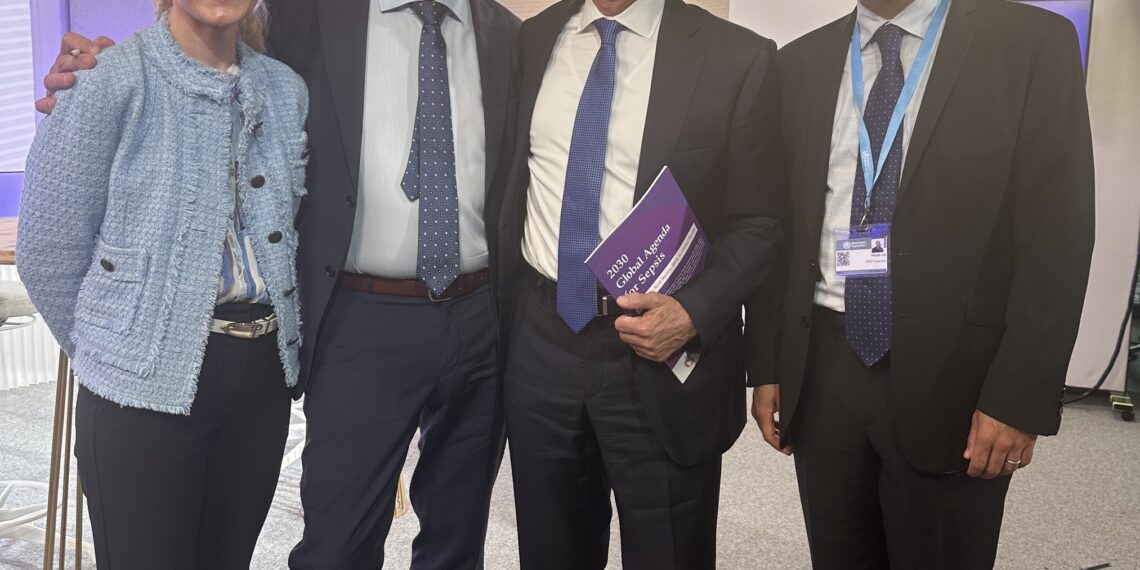 |
 |
Over half of deaths in low-and middle-income countries could be addressed with effective emergency care.
GENEVA, May 21, 2025 /PRNewswire/ — A newly-announced philanthropic partnership between Laerdal Global Health and the WHO Foundation will fund WHO to scale up acute care training for health workers in select African countries.

At WHA 2025, Laerdal Global Health and the WHO Foundation announced a US $12.5M commitment to expand Basic Emergency Care in Africa. From left: Ingrid Laerdal, Chief Impact Officer, LGH; Tore Laerdal, Founder, LGH; Thomas Zeltner, Chair, WHO Foundation; Raj Panjabi, Board Member, WHO Foundation.
Laerdal Global Health founder, Tore Laerdal and WHO Foundation Chair, Thomas Zeltner announced the US $12.5 million commitment at an event during the World Health Assembly in Geneva on Tuesday 20th May 2025.
This contribution includes support for WHO Basic Emergency Care training in 400 hospitals across three African countries, as well as specially designed training kits for ongoing workplace-based training.
In association with this core commitment, the WHO Foundation and Laerdal Global Health have also established a funding consortium – Lifeline: the Acute Care Action Fund – and are already in active discussions with other private and public partners to reach a total of $25M to bring this program to 1,000 hospitals in five or more countries, saving an estimated 50,000 lives every year.
The Basic Emergency Care (BEC) program was developed in 2016 by WHO, with the collaboration of the International Committee of the Red Cross and the International Federation for Emergency Medicine. Since that time, tens of thousands of health workers have been trained in Basic Emergency Care across more than 60 countries.
Prior studies in first level hospitals across Africa and Asia showed a 34 to 50 percent reduction in mortality from acute conditions –- including pneumonia, road injuries, diabetic crisis and post-partum haemorrhage – following the implementation of the BEC program.
“We know that the Basic Emergency Care program can reduce mortality from a range of acute conditions by up to 50 percent,” says Tore Laerdal.
“We have been privileged to collaborate with WHO, the International Federation for Emergency Medicine, and the International Committee of the Red Cross in developing a new course model that uses simpler and much more affordable training materials, enabling ongoing refresher sessions at each hospital,” he adds.
“Strengthening health systems and supporting health workers to deliver effective acute care is essential to universal health coverage and health security,” says Bruce Aylward, Assistant Director General, Universal Health Coverage, Life Course Division, WHO.
“This support to bring the Basic Emergency Care program to scale— particularly at this time of constricting resources— will have a critical impact around the world.”
WHO Foundation Chair, Thomas Zeltner, adds: “This generous and timely contribution from Laerdal Global Health supports WHO’s vital work at a time when funding for global health is under threat.”
“We now invite others to join Lifeline: the Acute Care Action Fund to support the scale-up of the BEC program across the region and beyond – including in humanitarian settings – saving millions of lives.”
About Laerdal Global Health
Laerdal Global Health is a not-for-profit company dedicated to helping save lives in low-resource settings. It develops simple, scalable, and locally adaptable solutions for health worker training and clinical care—supporting countries to improve outcomes for mothers, newborns, and people affected by trauma, sepsis, and other acute conditions.
Working in close collaboration with governments, global and local partners, Laerdal Global Health works to strengthen health systems by empowering frontline providers with the tools, skills and confidence they need. It is part of the Laerdal group, a mission-driven organization with a shared goal of helping save one million more lives, every year, by 2030.
About the WHO Foundation
The WHO Foundation, headquartered in Geneva, Switzerland, is an independent grant-making organization that supports the mission of the World Health Organization. It mobilizes philanthropic capital and builds catalytic partnerships to address the world’s most pressing health challenges, especially for vulnerable communities.





